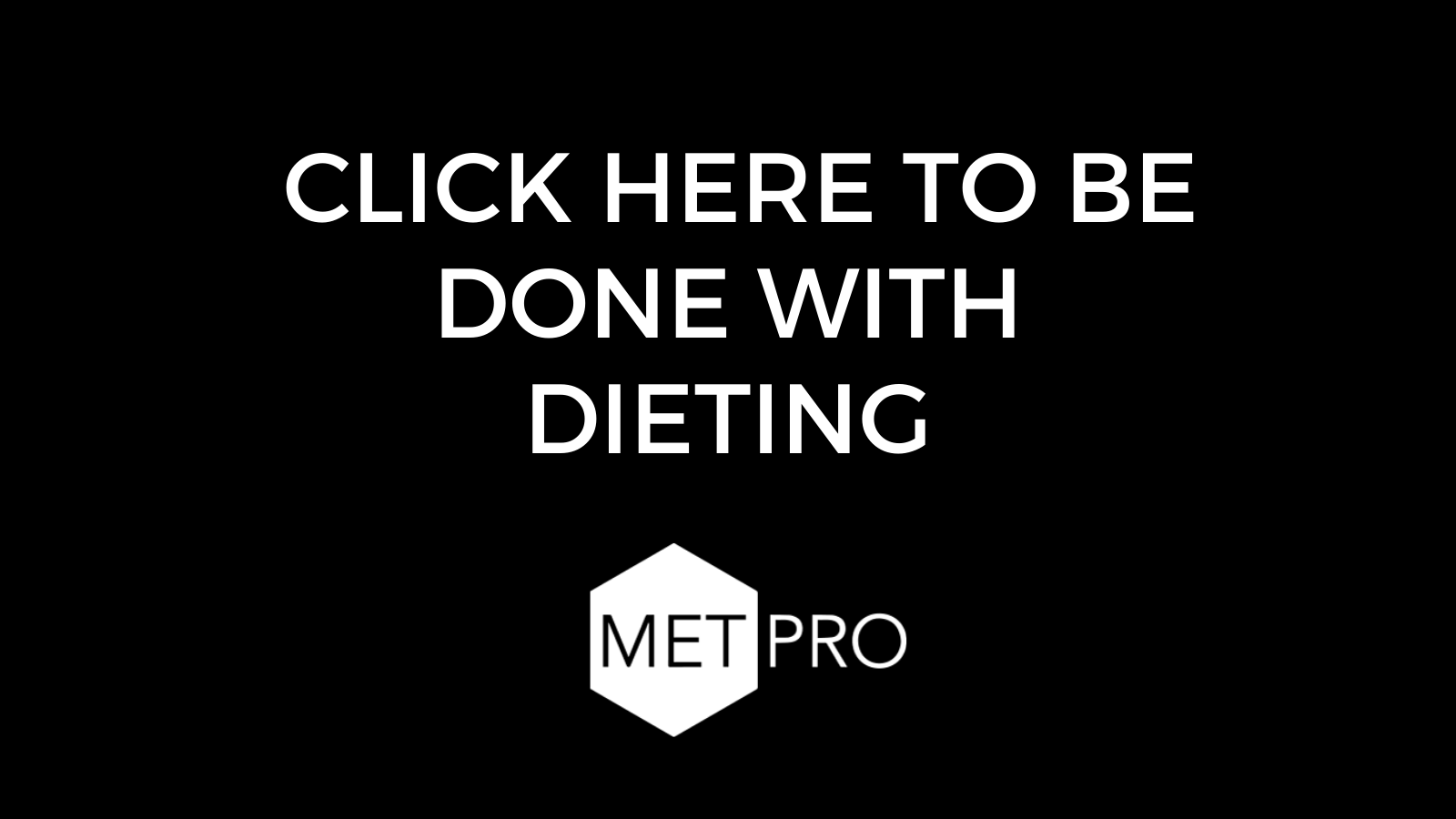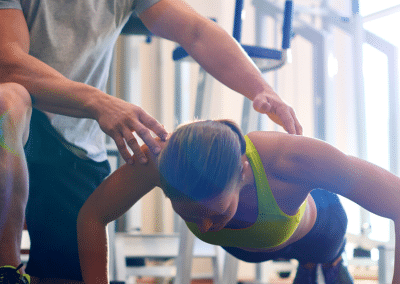In this episode, I am joined by MetPro Coach Cat Ramirez and we will be discussing ways to continue your exercise journey while also dealing with an injury. Cat, thank you so much for joining me.
Thanks so much for having me, Crystal.
I feel like maybe we need to start with why it might be important for someone to continue exercising even if they are injured.
Injuries can be many things. They can look like a lot of different things. For instance, something that might be considered an injury, and this is a huge pet peeve of mine because it is not an injury, is after giving birth to a child or the postpartum period. Secondly, we've got a true injury. You were out playing soccer with your kids and you went left your ankle and right. Something bad happened. Also, something to consider is you have surgery. You're coming back from surgery or something that has been like a nagging thing for a long time.
In your glory days, something occurred and now your knees are more susceptible to aches and pains and things like that. In those ways, you're going to treat them differently, but across the board, it is important to maintain physical activity and exercise. We'll get to what exercise means and put it into context. It's important because that's an important part of their recovery process. No one ever got better by doing absolutely nothing. Otherwise, there wouldn't be such things as physical therapy.
Exercising can look like many different things. For instance, postpartum exercise can look like breathing exercises to strengthen our diaphragm and our transverse abdomen and have everything come together and integrate again. Maybe exercise post-surgery can look like working cross-body systems. What I mean by that is this. Your injury was on your, let's say, left shoulder. It’s where you had an injury and some surgery.
Our body wants to even out across the center of our body. Left shoulder, right hip. Doing work around that right hip to strengthen everything along with obviously your core work. Maybe it looks like physical therapy on this arm, but utilizing some weight on this arm as long as your core is strong enough to keep you in a steady and sturdy position It is something like that. If it is a long-standing, nagging condition, there's no actual injury there anymore. It's something that bothers you. Maybe treatment or workaround. It looks like properly warming it up and cooling it down or prehab stuff. It's like you know it’s going to be finicky.
Whatever that is, you’ve got to treat it like it's a 100-year-old body as opposed to a 30-year-old body. It’s things like that. When people are like, “I injured myself and so I cannot do this anymore,” we can look at it as maybe modifying something to meet the injury is going to be appropriate. Obviously, with clearance from your doctor and medical professionals.
One of my favorites when people are like, “I can no longer squat ever again.” I'm like, “Dang, then never sit down to eat. Never go to the bathroom. Never get in and out of your car and make sure you never drop anything because you are going to be in a world of hurt.” I understand what they're saying, like, “I can never squat again.”
Maybe you're not going to back squat 300 pounds or with any weight. I understand that, but we should at least be able to move our body in the planes it was meant to move in. One of those huge ways it was meant to move in is squatting down. Getting stuff out of your car, picking up your kids, sitting in your chair, you know, at work or using the bathroom. We need to do that stuff. Being able to adjust or modify the movement to keep us healthy and functional is so important.
I tell my ladies this all the time, especially my moms. You've got your purse, you've got your diaper bag. You've got your kid, maybe two kids. You've got your groceries and then like the beverage that you're trying to bring in from the car in one trip. How many times have you been there? Think about how much that weighs and then that should give you a good idea of like, “What is a weight that I should be working towards or feel comfortable utilizing?” It doesn't need to be 200 pounds all the time.
You back up and think you don't have to start where you want to end. You start at a lower weight to get yourself acclimated to the movement.
A 100% or with zero weight. The other thing is there are many movements to service the same area. For instance, let's use squats. “I can never squat again.” Let's say that's true. Let's look at what we're working on when we squat. Most of the time, it's going to be real quad-heavy when we’re squatting in life. If you're doing a powerlifting squat, that's going to be more of your glutes, hamstrings and hip strength. In normal life, think about picking your groceries up from the ground, getting something off the floor, in and out of your car. It's more quad-heavy. Also, your hip strengths and your core strengths, so you don't flop over onto your face.
Things that we can do that are going to intentionally strengthen those parts of the body that are not squats. Hip thrusts. We can use kneeling squats. We can do like quarter squats to something that's elevated. We can do little med ball tosses where we're still activating that hip. We can do kettlebell swings. For core work, we can do all of the planking, the side planks, and the hollow body stuff. I don't like to throw on crunches too often because most of the time, the crunching motion is for aesthetics.
Realistically, it's not super functional. The twisting motions for your core are great. The rotational staff is great. All those things are going to serve you throughout your life. You need to turn to get something. You need to turn to pick up your kid and bring them back to your lap and things like that. If you fall down to the ground, you need to know how to get back up off the ground. How to get onto all fours comfortably and how to utilize those core muscles to help yourself come to a kneeling position and then a lunge position, and then stand all the way up? We want to think about things that are going to serve you and carry you throughout the rest of your life.
You're coming at this conversation from a mobility standpoint, which makes perfect sense. Would you include that same mobility conversation if somebody has, let's say broken ankle and they're recovering? Would you go through the same types of things or would you think about this approach differently?
Something like that, yes. Mobility is going to be huge. We don't want that ankle to freeze up. We don't want it to heal in one position and then you can never move it again. Mobility is always going to be key. We're humans. We are mobile beings. We need to be able to move. With mobility, a lot of times, you go like, “Mobility, stretching, rolling and stuff like that.” Not necessarily. We want to be able to utilize the movement patterns that are necessary for life and find ways to strengthen those movement patterns.
Ankle things. Our ankle sits like this. Do you want to be able to come up into an elevated position and then back down? We can do that without putting pressure by sitting on the ground and mimicking those motions by using bands, by using manual resistance from somebody and then working our way up to putting body weight onto it and doing movements in that way. We also want to make sure that we're not just strengthening in one way, front to back.
With our ankles and mobile joint, you can move your foot around like that. We need to address the lateral stability of that ankle. You are utilizing manual manipulation with a physical therapist, no band work. Just being able to lift your ankle and move it side to side. Once you progress to a standing position and are able to put bodyweight on it and then utilize those lateral movements to strengthen that way.
If a person is injured, however, they're injured, the first thing you mentioned was to get your doctor's clearance before you're doing anything. Once you have that to start moving and you start your goal, “I want to do the mobility. I want to get back to wherever I was before,” let's say that you're not familiar with all those different planes of motions for the body parts, where's a good place to start?
Always get clearance from your doctor first and then a great place to start is physical therapy, especially if it's a significant injury or you're coming back postpartum. Physical therapy is not something that is thrown out there regularly as a part of a regular postpartum visit and I don't know why.
I don't think I've ever heard anybody suggest that.
I have no idea why. It's the wildest thing to me. Yes, females are made to carry babies and make children. However, that doesn't mean that it is easy on your body. I went from being a world-ranked Olympic lifter to getting pregnant. Coming out of that pregnancy, it was very shocking to me. I was in a good place, but still, there were certain things that were very shocking to me at how weak I was.
On top of that, I ultimately had to have a C-section with my son. After labor, it didn't go the way I wanted it to go. Somebody is cutting into your body and cutting the muscles apart. Having those heal back together is quite a journey. I was so taken aback by the lack of communication around like, “This is what's going to happen after the C-section and you won't be able to do this.”
Even somebody who has been in the fitness industry as long as myself, even somebody who was a world-ranked Olympic lifter, I'm like, “I guess I wouldn't be able to just sit up,” but it was still very shocking to me. I was like, “Why can't I do this?” It's important that you're advocating for yourself, first of all, but that the conversation should always come back around PT. If you sustained an injury at all or have been through surgery or you’re postpartum, go to physical therapy, at least for a little bit. It will help.
If people don't know if their insurance covers that or how to access that, the first thing they should do is talk to their regular doctor first to get pointed in the right direction and to understand where they should go from there.
If you have a significant injury, I hope that you're seeing a doctor. If you're having a baby, I hope that you're seeing a medical professional. Maybe it's a midwife or whatever, but you can ask them. You can also just call your insurance. I do it all the time. My son has cerebral palsy. I call all the time. We move a lot and so I'm like, “We've moved. I need to know how we're going to get this started. This is where we're going and tell me what I can expect.” They tell me everything. You can just call your insurance company and ask for that. You can also ask the physical therapy place. They usually are pretty good about letting you know what your insurance covers and what it doesn't cover. You can then create a plan that works for you.
The physical therapist is great. If you are injured, I would start there. If there's an actual injury, I would not go to a trainer unless they have a physical therapy background or something to that extent in which they could properly assess an injury. Once you've been cleared by physical therapy and your doctor to resume normal activity, then go see a qualified coach or a performance coach or a trainer and work with them for a while because you only know what you know.
Maybe it's not even on your radar to understand what movement might be for a certain plane. You're not going to get that except a professional. I would absolutely go to a reputable gym or studio or ask a physical therapist and say, “I'd like to resume normal activity or training. This is my sport. My coach doesn't have the experience with this specific injury. Is there somebody or a place here that you could refer me to that I could go and maybe do like a ten-pack of sessions just so that I can start on my way to getting stronger again?”
Cat, I'm curious. If we have people listening who are MetPro concierge clients, when would it be appropriate for them to go to their coach and say, “I've had this injury? When is it appropriate for me to work with you? How do I do that?”
I want to strike on two points with this. First of all, the very best thing you can do if you are injured or have to take a step back from physical activity or sport is to stay on top of your nutrition 100%. The same abs made in the kitchen are not just for aesthetic reasons. If you are on top of your nutrition and working with your MetPro coach, utilizing the nutritious food that we promote and that's in the app and the combinations, the glycemic loading, that's going to promote a healthy hormone balance is going to 100% help to expedite that recovery.
On top of that, it's going to help you from taking backward steps even more. A lot of my female clients coming back from having children, even if they're athletes used to training hard, the first thing is I’m always like, “Get on top of your nutrition.” You’ll be so surprised at how quickly you'll come back from this. You'll be so surprised at the movement you can make aesthetically to feel better. You'll see all of that happen by just dialing in your nutrition. That's the first thing.
Secondly, once you've been cleared by your medical professional to move on to normal body weight activity or weight-bearing activity, your MetPro Concierge Coach can absolutely help you discern which workouts are going to be best for whatever your target area is or an overall whole-body approach. The other thing with that is we have a great series. It's under the specialty programming and it's a posture series. Doing the posture series is huge.
These are workouts in the app, right?
Yes. These are available to our concierge clients and our basic clients, but your concierge coach can help you find the correct posture series that will help you heal and keep your body in alignment. It's also pretty challenging. I did. I have three babies back to back and then I had to have major abdominal surgery. It’s been a heck of a few years. Staying on my nutrition and doing the posture series was huge. It helped me so much.
You’re going to lose a little bit of strength, but your coach can gear some workouts towards what you need to accomplish in order to come back or direct you to like, “I want you to do this specific cadence for the week like endurance, strength, isolation,” or whatever it is. They can work with you to come up with a personalized plan that will address whatever you're going through.
You have a medical professional, physical therapist and you're working with your MetPro coach. This is the general gist. That's how to start and how do you know when you're ready to progress to the next level? If you’re like, “I'm feeling not 100%, but I'm feeling really good,” how do you know you're ready to move forward?
A lot of that is going to be if you're already cleared and you feel like you can push things a little bit more. A lot of that is just going to be by feel. Are you still experiencing pain? What does your recovery look like? Are you doing a workout and then you're sore for like six days after that? That's not normal. Things like that will be good indicators as to whether or not you're ready to progress and being patient. Many people go by the more is better philosophy and sometimes adjust more.
You can make some significant strides with not very much and just being consistent, pushing the weight. If you're somebody that's like, “How do I know when to increase weight?” Having a goal weight in mind, what is a good number? My kid weighs 25 pounds. I’ve got to pick up my kid. Twenty-five pounds is maybe what I'm working towards maybe.
Maybe I regularly have to pick up my 60-pound dog. Let's have 60 pounds as the goal and then just work a linear progression to meet that goal. What I mean by that is week one, maybe you're starting with three pounds, week two, eight pounds. Be able to hit those reps and sets successfully without experiencing unnatural soreness that's out of the ordinary or pain.
Do you feel like there's anything we missed? Is there anything else that people at home reading should consider regarding injuries?
I get a lot of questions from people with injuries for two different things. First of all, “I’m injured, so I should decrease my calories because I'm not moving around as much.” No, that is not the answer. First of all, we work on metabolic rehab. That's what we do. We rehab your metabolism to get to a healthy place so that you can manipulate it whether you're trying to gain weight or lose weight or maintain weight. When you decrease your intake, you're naturally asking your body to slow down that metabolism.
If we are upping our metabolism, we've got more going on in our bodies. We can also say that we are helping to expedite that healing process. We want to make sure that we are still adequately fueling our metabolism. That could look like two different things. That can look like a maintenance plan in which you have an adequate amount of carbohydrates, fat and protein. It can also look like doing repair cycles, so we are asking your metabolism to do more. Your coach is always going to be the person that is going to work with you to determine what's best for you.
Your concierge coach is always going to take a look at things and be like, “We're putting on some weight here and it's not leveling out. Your metabolism is responding. I would like it to, so we're going to change course in this way.” Secondly, I get a lot of questions around, “Should I take supplements to help with healing?” I am not a huge advocate of supplementation, contrary to what a lot of people think. A lot of people are like, “You're in weightlifting. You probably like to do a lot of supplements.” I do not.
I am a huge advocate of whole food healing unless there's something wrong with you, like you have an actual condition where you cannot process and absorb nutrients. You're going to get those nutrients if you're eating correctly. If you're eating your vegetables, fruits, protein, and carbohydrates, there's no need to supplement.
Your coach might decide, “I want to put you on a little bit higher protein and a little bit higher fat during this time.” That might be something that your coach determines is appropriate for you, but you don't need to take something to help with the healing. Your body will heal itself. That's what we're meant to do as long as you are a healthy person and there's no underlying conditioner or co-morbidity.
If that is a concern, people should probably just check with their doctor. That makes perfect sense.
That’s how you’ll know. Check with your doctor. Don’t take it upon yourself to do a mail-away kit. I always tell people, “A nice balance of a little granola and then Western medicine.” I'm not the mom that's like, “Something happened to my kid. Let's go straight to the doctor.” A doctor is a doctor for a reason and they are in a medical professional. They had to do lots of schooling, residencies and specialty work and all kinds of things.
They've got the experience with it. That doesn't mean that you shouldn't get a second opinion if you feel like you need to, but they are the professionals. Just like you wouldn't call your buddy and be like, “I think I've got a toothache. Why don't you come on over and fix it for me? You're pretty handy with pliers. That's probably all you need.” You want to go to a professional so yes, go see the medical professional necessary for what you're experiencing and then create your support team, which includes your MetPro coach.
I appreciate all of the different tips. Thank you so much for your time, Cat. Can you give people your email address to reach out to you if they have any questions?
You can reach me at Cat@MetPro.co. You can absolutely email me with any questions and I will either answer them or direct you to the correct person.
Readers, that is all for this episode. You can find the MetPro method episodes anywhere you get podcasts, or you can go to MetPro.co/podcast. Please be sure to follow the show and rate and review. It lets other people know what they can expect from the show. You can also learn more about MetPro at MetPro.co. I will be back on the next episode. Until then, remember, consistency is key.






